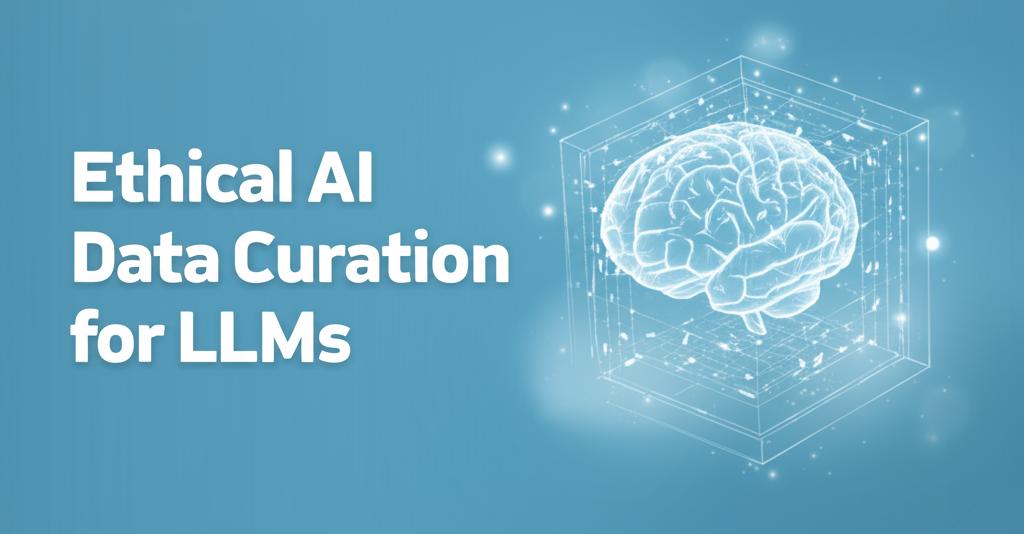The development of Large Language Models (LLMs) has surged, bringing transformative capabilities to various fields. However, the data these models are trained on is a critical factor in their performance and, importantly, their ethical implications. Curating this data ethically is paramount to ensuring LLMs are fair, unbiased, and do not perpetuate harm.
At its core, ethical AI data curation involves a multifaceted approach to collecting, cleaning, and managing the vast datasets LLMs learn from. One of the primary concerns is bias. LLMs trained on data reflecting societal biases can inadvertently learn and amplify these prejudices, leading to unfair or discriminatory outputs. This is particularly problematic in high-stakes applications. To counter this, efforts are focused on balanced dataset curation, employing bias detection algorithms, and fine-tuning models with fairness constraints. Ensuring diverse development teams also plays a crucial role in identifying and mitigating potential biases from varied perspectives.
Privacy is another significant ethical hurdle. LLMs are often trained on enormous datasets scraped from the internet, which may contain personal, copyrighted, or sensitive information without explicit consent. This raises serious questions about data privacy and the potential for models to regenerate or infer this sensitive information. Responsible data collection practices, robust anonymization techniques, and clear guidelines for data usage are essential. Adhering to data protection laws and implementing opt-out mechanisms for users to control their data are also key best practices.The sheer volume of data required for LLMs presents data management challenges. Traditional methods are often ineffective, leading to both ethical and legal data governance issues. Careful curation is needed to filter out low-quality, irrelevant, or harmful content. This includes content that is toxic, discriminatory, or could be used to spread misinformation. Techniques like using "guardrail models" can help clean harmful content from training data or guide the LLM to avoid producing such content.
Transparency and accountability in data curation are also vital. The "black box" nature of many LLMs makes it difficult to understand how they arrive at their outputs, complicating efforts to attribute responsibility when errors or biased outputs occur. Documenting data sources thoroughly, including the time period of data collection, and creating data dictionaries are crucial steps. Initiatives like the EU AI Act are pushing for greater transparency, requiring descriptions of data sources and summaries of copyrighted data used for training.Ensuring data quality and representativeness is an ongoing task. Using diverse data sources is key to building models that perform well across various linguistic and cultural contexts. However, accessing high-quality, diverse data can be challenging, especially for languages outside of widely spoken ones. The reliance on publicly available internet data can also introduce low-quality or inappropriate content. Advanced data filtering and ethical data collection practices are necessary to enhance data quality and model robustness.
The process of ethical data curation extends to intellectual property. LLMs often ingest copyrighted material during training, leading to complex legal questions about infringement when the model generates text based on these sources. Efforts are underway to establish frameworks for using openly licensed data and to ensure fair compensation for creators.
Finally, the environmental impact of training large models cannot be ignored. The significant computational resources required translate to substantial energy consumption. While not directly a data curation issue, the scale of data influences model size and training time, indirectly contributing to the environmental footprint.
Moving forward, a proactive approach involving collaboration between AI developers, ethicists, policymakers, and the public is essential. This includes developing and adhering to comprehensive ethical AI frameworks, implementing ongoing monitoring and auditing of LLM outputs, and fostering transparency about model capabilities and limitations. The goal is to harness the power of LLMs responsibly, ensuring they are developed and used in a way that benefits society while minimizing potential harms. This requires continuous vigilance and adaptation as these powerful technologies continue to evolve.

